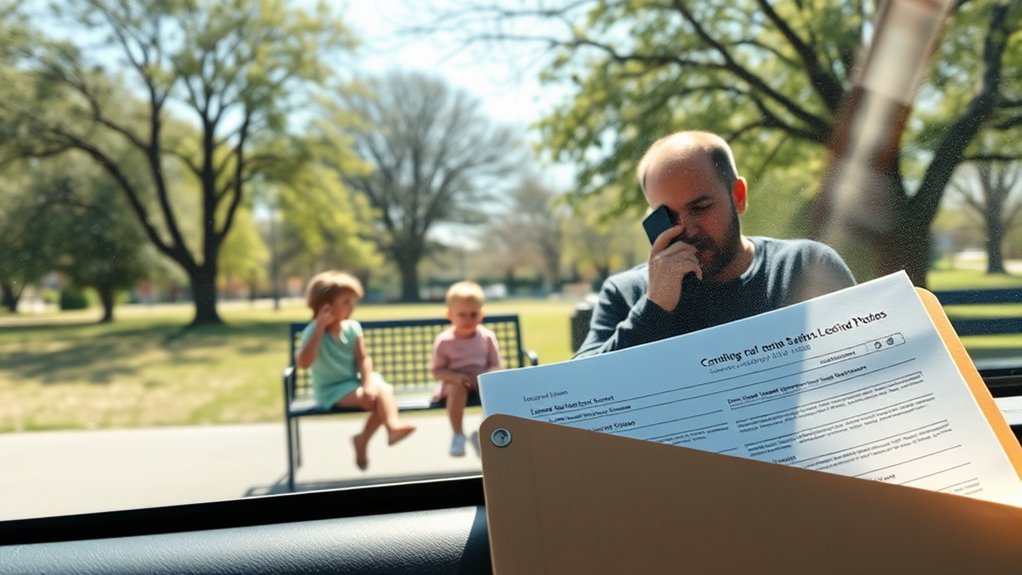Private investigators play an essential role in child custody disputes by gathering objective evidence through surveillance, background checks, and digital monitoring. They document parental behaviors, living conditions, and potential safety concerns while maintaining strict legal and ethical standards. Working alongside attorneys, investigators compile detailed reports and evidence that can greatly influence court decisions regarding custody arrangements. Understanding the full scope of investigation services helps parents make informed choices about protecting their children’s best interests.
Key Takeaways
- Private investigators gather crucial evidence through surveillance and documentation of parental behavior, living conditions, and adherence to custody agreements.
- Their unbiased, professional findings help courts make informed decisions about child welfare and custody arrangements.
- Investigators can uncover hidden substance abuse, neglect, or dangerous living situations that may affect a child’s safety.
- Digital monitoring of social media and online activities provides additional evidence of parental conduct and lifestyle patterns.
- Professional documentation and testimony from private investigators can significantly influence judicial decisions in custody disputes.
The Role of Private Investigators in Custody Cases

In child custody disputes, private investigators serve as professional fact-finders who gather and document evidence related to parental behavior, living conditions, and child welfare concerns. These professionals employ various investigator strategies, including surveillance, background checks, and interviews with relevant parties to compile thorough reports for legal proceedings.
Private investigators often work closely with attorneys and custody evaluations experts to establish patterns of behavior that may impact a child’s wellbeing. They document instances of neglect, substance abuse, or inappropriate conduct that could affect custody determinations. Their findings frequently become essential evidence in court, helping judges make informed decisions about custody arrangements. Through methodical observation and documentation, investigators provide an impartial assessment of each parent’s ability to provide a stable, nurturing environment for their children. Independent verification through surveillance reveals authentic parental behavior when individuals are unaware they are being observed.
Common Types of Evidence Gathered During Surveillance
Private investigators employ multiple surveillance methods to gather evidence in child custody cases, with digital monitoring of social media activities and online behaviors forming an essential component. Photographic documentation captures real-time activities, interactions, and behaviors that may impact custody decisions, including adherence to visitation schedules and child safety protocols. Activity logs and detailed reports provide chronological documentation of observed patterns, incidents, and potential custody agreement violations that courts may consider as evidence. Their expertise in ethical evidence collection ensures that all documentation meets strict legal standards for court admissibility.
Digital and Social Media
Digital surveillance has become an essential component of child custody investigations, with private investigators gathering substantial evidence from social media platforms, online activities, and electronic communications. While respecting digital privacy boundaries, investigators monitor public posts, shared photos, and online interactions that may impact custody determinations.
| Platform Type | Evidence Applications |
|---|---|
| Social Media | Lifestyle patterns, associations |
| Dating Apps | New relationships, activities |
| Location Data | Movement tracking, routines |
| Message Boards | Behavior indicators, interests |
| Photo Sharing | Living conditions, supervision |
The social media influence on custody cases continues to grow as parents increasingly document their daily lives online. Investigators analyze digital footprints to verify claims about parenting capabilities, lifestyle choices, and compliance with court orders, providing courts with objective evidence for custody decisions.
Photographic Evidence Collection
Building upon digital evidence collection methods, photographic documentation serves as a cornerstone of surveillance in child custody investigations. Private investigators employ specialized photographic techniques to capture evidence of parental behavior, living conditions, and adherence to custody agreements.
Investigators document various scenarios through high-resolution photography, including:
- Child exchanges between parents
- Home environment and safety conditions
- Interactions with unauthorized individuals
- Transportation and vehicle safety
- Public conduct and activities
- Physical condition of the child
Evidence preservation protocols guarantee photographs maintain their integrity for court proceedings. Investigators carefully catalog images with timestamps, locations, and contextual notes while maintaining proper chain of custody. This methodical approach helps attorneys and courts evaluate par
Activity Logs and Reports
Professional investigators maintain detailed activity logs and written reports to document their observations during child custody surveillance operations. These thorough records serve as essential evidence documentation that may be presented in court proceedings. Activity tracking includes specific dates, times, locations, and observed behaviors that could impact custody determinations.
Key elements of surveillance documentation include:
- Chronological timelines of parent-child interactions, including pickup/dropoff compliance
- Detailed notes about concerning behaviors, safety issues, or violations of custody agreements
- Documentation of third-party interactions and potentially harmful associations
- Records of patterns that demonstrate parental fitness or unfitness
The systematic compilation of these logs and reports provides attorneys and courts with objective evidence to evaluate parenting practices and make informed custody decisions based on the child’s best interests.
Digital Investigation Methods and Social Media Monitoring
The vast majority of modern private investigators employ sophisticated digital investigation methods and social media monitoring techniques to gather evidence in child custody disputes. Through digital footprint analysis, investigators can document patterns of behavior, lifestyle choices, and potential endangerment of children. Social behavior trends revealed through online activities often provide vital insights into parenting practices. Similar to how physiological response patterns help validate behavior in polygraph examinations, digital evidence creates a comprehensive picture of parenting conduct.
| Platform Type | Evidence Gathered | Legal Implications |
|---|---|---|
| Social Media | Photos/Activities | Lifestyle Documentation |
| Dating Apps | Relationship Status | Moral Conduct |
| Location Data | Movement Patterns | Child Safety |
| Financial Apps | Spending Habits | Support Capability |
| Message Boards | Public Comments | Parental Attitude |
Investigators utilize specialized software to capture and authenticate digital evidence, ensuring admissibility in court proceedings. These tools track online interactions, verify timestamps, and document potentially concerning behavior that may affect custody determinations.
Signs That Your Custody Case May Need a Private Investigator

Private investigators can detect signs of hidden substance abuse through surveillance of purchase patterns, disposal evidence, and behavioral changes that may impact child safety. Documentation of child neglect warning signs, including chronic absenteeism from school, inadequate supervision, or unsafe living conditions, often requires professional investigation to build admissible evidence for court proceedings. The presence of unauthorized overnight visitors during custodial time raises concerns about children’s exposure to unknown individuals, potentially necessitating investigative services to establish patterns and verify compliance with custody agreements. Licensed private investigators maintain strict confidentiality while gathering crucial documentation that can support the child’s best interests in custody battles.
Hidden Drug Use Detection
Drug abuse allegations in custody battles require careful documentation and proper evidence gathering to protect children’s wellbeing. Private investigators employ specialized techniques to uncover evidence of substance abuse that may impact parental fitness determinations. Through surveillance and documentation, investigators can establish patterns of behavior that support or refute drug testing results and allegations of impairment.
- Collection of discarded materials that indicate drug use or paraphernalia
- Documentation of suspicious transactions or meetings with known drug suppliers
- Photographic evidence of visible impairment during parenting time
- Verification of attendance at rehabilitation facilities or recovery meetings
Professional investigators maintain strict chain of custody protocols when gathering evidence, ensuring admissibility in court proceedings. Their findings often prove vital in cases where substance abuse impacts a parent’s ability to provide safe, stable care for their children, helping courts make informed custody decisions.
Child Neglect Warning Signs
Warning signs of child neglect can manifest in various observable patterns that may warrant professional investigation during custody disputes. Changes in child behavior, including withdrawal from activities, sudden academic decline, or emotional outbursts, may indicate underlying issues in the custodial environment. Poor hygiene, inappropriate clothing for weather conditions, or frequent unexplained injuries raise significant concerns.
Problematic parenting styles that suggest neglect include chronic tardiness to school, missed medical appointments, or inadequate supervision during visitation periods. Documentation of these patterns through professional surveillance can provide critical evidence for custody proceedings. Additional red flags include children appearing hungry, hoarding food, or displaying signs of physical or emotional distress when shifting between parents. These indicators, when properly documented, help courts make informed decisions regarding custody arrangements.
Suspicious Overnight Visitors
Beyond the basic signs of neglect, the presence of suspicious overnight visitors in a custodial parent’s home can greatly impact child welfare and custody arrangements. Private investigators can document patterns of suspicious behavior involving overnight guests that may affect children’s safety, stability, and emotional well-being. Courts take these matters seriously when evidence suggests rotating partners or questionable individuals are regularly present during parenting time.
- Frequent different overnight guests creating an unstable environment for children
- Individuals with criminal histories or concerning backgrounds staying in the home
- Pattern of overnight visitors during times when children are present
- Evidence of romantic partners being introduced prematurely or inappropriately to children
Professional documentation of these circumstances can provide critical evidence for custody modifications, particularly when the custodial parent’s judgment regarding overnight guests raises legitimate concerns about child safety and welfare.
Legal Boundaries and Ethical Considerations
When private investigators operate within child custody disputes, they must carefully navigate a complex framework of legal restrictions and ethical guidelines that govern their conduct. Private investigators must adhere to strict legal guidelines regarding surveillance, documentation, and evidence gathering to guarantee their findings remain admissible in court. They are prohibited from trespassing, wiretapping without consent, or accessing private records without proper authorization.
The ethical implications of investigating parents during custody battles require careful consideration. Investigators must balance their duty to uncover relevant information with respect for privacy rights and the best interests of the children involved. They should avoid actions that could traumatize children or escalate tensions between parents, while maintaining professional objectivity throughout their investigation. Professional investigators typically charge hourly rates between $50-$150 based on the complexity of custody cases.
Cost Factors and Investment in Professional Investigation
The financial investment required for private investigation services in child custody cases varies considerably based on multiple factors, including the scope of surveillance needed, the complexity of the case, and the geographic location where the investigation takes place.
Cost considerations typically encompass both immediate investigation fees and potential long-term value in supporting a custody case. Understanding these expenses helps parents make informed decisions about resource allocation during legal proceedings.
- Hourly rates for surveillance and documentation typically range from $75 to $250 per hour
- Retainer fees may be required upfront, often starting at $2,000
- Travel expenses and specialized equipment costs are usually billed separately
- Court appearance fees for investigators to testify about findings generally start at $500 per day
Professional investigators emphasize discreet handling of sensitive family matters while maintaining high standards of evidence collection for court proceedings.
Working With Your Attorney and Private Investigator

Successful collaboration between attorneys and private investigators requires clear communication channels and well-defined roles throughout child custody investigations. Strategic planning between all parties guarantees efficient use of resources and prevents duplication of efforts. The attorney guides the legal strategy while the investigator gathers evidence to support the case.
| Phase | Attorney Role | Investigator Role |
|---|---|---|
| Planning | Define objectives | Develop investigation plan |
| Discovery | Review legal requirements | Gather evidence |
| Analysis | Evaluate findings | Present detailed reports |
| Court | Present case | Testify if needed |
Effective communication between the client, attorney, and investigator is essential for maintaining confidentiality and achieving desired outcomes. Regular updates and structured reporting help attorneys incorporate investigative findings into their legal strategy while guaranteeing all activities remain within ethical and legal boundaries. Digital forensics techniques provide critical evidence gathering capabilities that strengthen child custody cases through thorough documentation and analysis.
Key Documentation and Evidence Collection Strategies
Professional documentation and evidence collection form the foundation of effective child custody investigations. Investigators must employ systematic documentation strategies and evidence assessment protocols to build credible cases that meet legal standards. When gathering information, all activities, observations, and findings require detailed documentation using established methods that guarantee admissibility in court proceedings.
- Video and photographic evidence must follow chain-of-custody procedures and include time/date stamps, location data, and context descriptions
- Written records should document specific incidents, patterns of behavior, and witness statements with detailed notation of dates, times, and circumstances
- Digital evidence collection requires proper extraction and preservation techniques to maintain data integrity
- All documentation must align with state laws governing surveillance, recording, and evidence collection in custody cases
Counter-surveillance techniques may be necessary to ensure the integrity of evidence collection when monitoring parental conduct.
Impact of Investigation Findings on Court Decisions
Private investigator findings can greatly influence judicial decisions in child custody disputes when properly presented and authenticated. Courts often rely on investigation outcomes that reveal essential information about a parent’s lifestyle, behavior patterns, and ability to provide proper care for their children. Evidence of substance abuse, neglect, or unsafe living conditions can notably impact custody determinations.
The judicial impact of private investigator findings extends beyond basic documentation, as courts evaluate the totality of evidence presented. Professional investigators’ reports, photographic evidence, and witness statements help judges make informed decisions about the best interests of the child. When investigators follow proper protocols and maintain chain of custody for evidence, their findings become valuable tools for attorneys arguing custody cases and for courts aiming to protect children’s wellbeing. With over 125 years experience, Stillinger Investigations conducts thorough child custody investigations that evaluate the best interests of children according to South Carolina laws.
Frequently Asked Questions
How Long Does a Typical Child Custody Investigation Take to Complete?
Child custody investigation duration typically ranges from two to six weeks, depending on case complexity, evidence requirements, surveillance needs, and the scope of activities requiring documentation for court proceedings.
Can Private Investigators Interview My Child’s Teachers or Caregivers?
Teacher interviews and caregiver interactions are legally permissible in public settings, though investigators must respect privacy laws and obtain proper authorization through appropriate channels when gathering information about minors.
What Happens if the Investigator Discovers Criminal Activity During Surveillance?
Investigators must report criminal activities to law enforcement while adhering to ethical considerations. Evidence admissibility depends on proper documentation and legal collection methods during surveillance according to state regulations.
Do Judges Always Accept Evidence Gathered by Private Investigators?
Judges evaluate evidence admissibility based on how investigators obtained it and their credentials. Courts may reject evidence gathered illegally or by investigators lacking proper licensing and professional qualifications.
Can I Hire a Private Investigator Without Telling My Attorney?
While clients may independently hire investigators, legal professionals recommend informing attorneys to maintain proper hiring protocols, avoid confidentiality issues, and guarantee all evidence gathered aligns with case strategy.
Conclusion
Private investigators serve as critical assets in child custody disputes by gathering admissible evidence through legal surveillance, digital monitoring, and documentation. Their findings can considerably influence court decisions when conducted within ethical and legal boundaries. While hiring an investigator represents a substantial investment, the documented evidence they provide often proves decisive in protecting children’s best interests and establishing the truth in contested custody matters.






